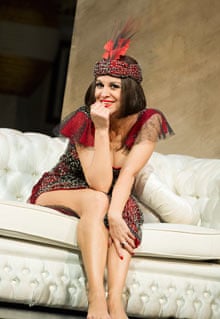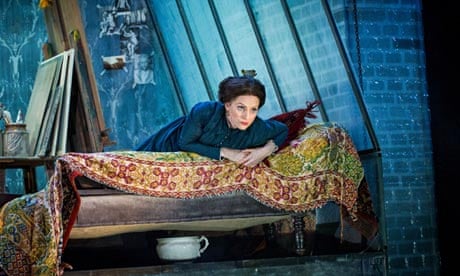"Paris is the city of desire," exclaims the naive juvenile tenor in Puccini's La rondine as he arrives in the metropolis, where he hopes to be corrupted. Opera more or less instantly fulfils the wishes of those who crave pleasure, and within half an hour a licentious soprano has taken care of his sexual education.
Holland, on the other hand, is hardly the place to set an opera about decadence and the systematic derangement of the senses. But it was in the Low Countries that Saint-Saëns bathetically chose to locate La princesse jaune, his short comic opera in which an opium-addled artist is infatuated by a yellow princess called Ming, a fantastical creature who simpers in a Japanese print on his wall. At the Buxton festival, the director Francis Matthews has smartly transferred the location to Paris, making the hero Kornélis a bohemian who inhabits a leaky tenement with a chamber pot under his tousled bed. His cousin Léna unrequitedly pines for Kornélis while cleaning his squalid room; at last she cures his mania by stepping into his hallucinations and impersonating the unobtainable Ming. Anne Sophie Duprels, who gives a spirited account of the drab Léna, has spent the summer in an imaginary Orient, with a stint as Butterfly at Holland Park and a forthcoming Buxton concert of Ravel's Shéhérazade, which begins with the soprano yearning for a fairyland she calls "Asie".
"Charmante réalité," she and Kornélis sing after the intoxicating fumes clear – hardly the most enraptured of operatic climaxes. Saint-Saëns himself was less charmed by the stuffy reality of Paris during the Second Empire, and travelled constantly in quest of exotic sounds and, it is thought, spicier sex. Like Puccini's Madama Butterfly, La princesse jaune gestures towards Japan in its use of pentatonic melodies, but the score sounds more Arabic than Oriental, perhaps remembering the winters Saint-Saëns spent in Algiers with a harem of local lads. Could the yellow princess really be a prince of another complexion altogether?
Matthews awards Duprels a silent walk-on in Gounod's La colombe, with which La princesse jaune is ingeniously paired. Here she's a solicitous neighbour of the impoverished aristocrat Horace (Ryan MacPherson, also cast as Kornélis) who has spent his fortune on a haughty countess and now consoles himself by adoring a dove, his caged substitute for a flighty mistress. Thanks to a clever set by Lez Brotherston, Horace lives on the floor below Kornélis: this particular Left Bank address specialises in young men with perverse erotic quirks.
In his little comedy Saint-Saëns recalls the conflict between voluptuous Philistines and sanctimonious Hebrews in his grand opera Samson et Dalila, and Gounod in La colombe likewise parodies his own more pompous Faust. The disgruntled servant Mazat, a travesty role sung by Emma Carrington, delivers a misogynistic rant that is as ferocious as the tirades of Mephistopheles in Faust, and the tinselly coloratura of the Countess, brilliantly dispatched by Gillian Keith, is a reminiscence of Marguerite's bedazzlement when she opens the jewel casket deposited in her garden by the devil. The highlight is an aria about cooking, sung by a majordomo (Jonathan Best) who has to prepare a meal in the absence of ingredients: Gounod's admission, perhaps, that opera was a culinary art, pandering to the jaded palates of the Parisian bourgeoisie. I remembered, as I listened to Best's gabbling patter, that Simon Callow once described Saint-Saëns as "the Escoffier of music". The genuinely festive double bill is conducted by Stephen Barlow, whose imaginative programming and communicative energy have made Buxton irresistible.

Angela Gheorghiu has recently been concentrating on the soap opera of her private life: an improbable fling with a Romanian countertenor whose falsetto voice sounds decidedly unvirile, followed by sobbing allegations of spousal abuse against her former husband, the tenor Roberto Alagna. Now she has taken time out from her career as a celebrity to appear in the Royal Opera's revival of La rondine. It is at first a rather wistful occasion. The lunar glow of Gheorghiu's voice sounds wan, and her intonation often sags; never having developed as an interpreter, she can only compete with our memories of her dewier prime. But in the last scene her singing is almost desperately fervent, abandoning her customary narcissism. Has she realised that she needs to justify her reputation, and the exaggerated prices charged for admission to her presence?
Gheorghiu compensates for the ageing of her voice by sexily revising the costumes she wears as Magda, the courtesan who rejects her rich protector for the love of the ingenuous Ruggero (sung with thrilling ardour by Charles Castronovo). A feathered headdress has been added to her outfit for the opening party, which incongruously turns her into a Cherokee squaw; her spangled flapper's skirt is slit up the side to a point just south of her armpit. When Nicolas Joël's production was new in 2002, the dress for Magda's bucolic retreat by the sea had a demure high neckline, signalling reformation. The version Gheorghiu has slithered into this time is dangerously décolleté, which gives the efforts of Puccini's menopausal heroine to fascinate her much younger boyfriend a certain autobiographical pathos.
At the end Magda generously renounces Ruggero, whose mum will never permit him to marry a tart; her sacrifice is spiritualised by a plucked harp and a tolling church bell as, having already walked offstage, she sings a soft, grieving A flat. When I saw the Met's replica of the Covent Garden production in New York recently, Kristine Opolais touchingly voiced that last elegiac note in a sombre twilight as she ventured into an uncertain future. Gheorghiu, however, advances to the front of the stage rather than drifting into the wings, and attitudinises in a spotlight as if luxuriating in a shower of golden coins. She blasts out a note that ought to shimmer invisibly in the distance, then holds her pose, awaiting – or demanding – applause. Magda, like her voice, is meant to fade away; the self-admiring, unapologetic Gheorghiu evidently has no intention of going quietly.

Comments (…)
Sign in or create your Guardian account to join the discussion